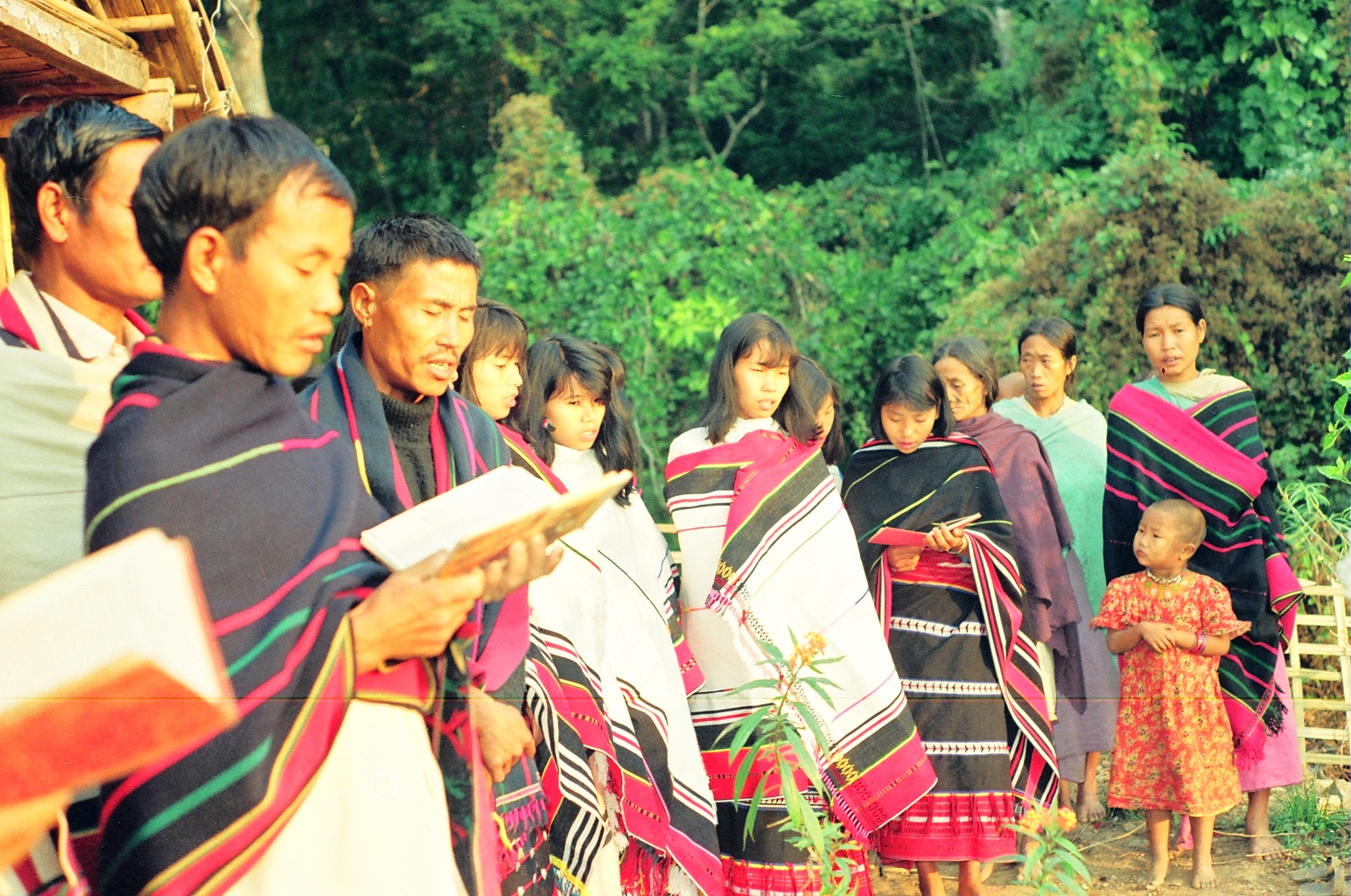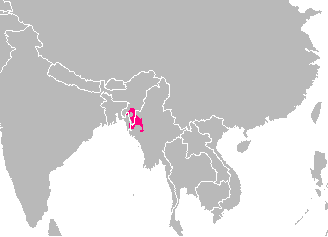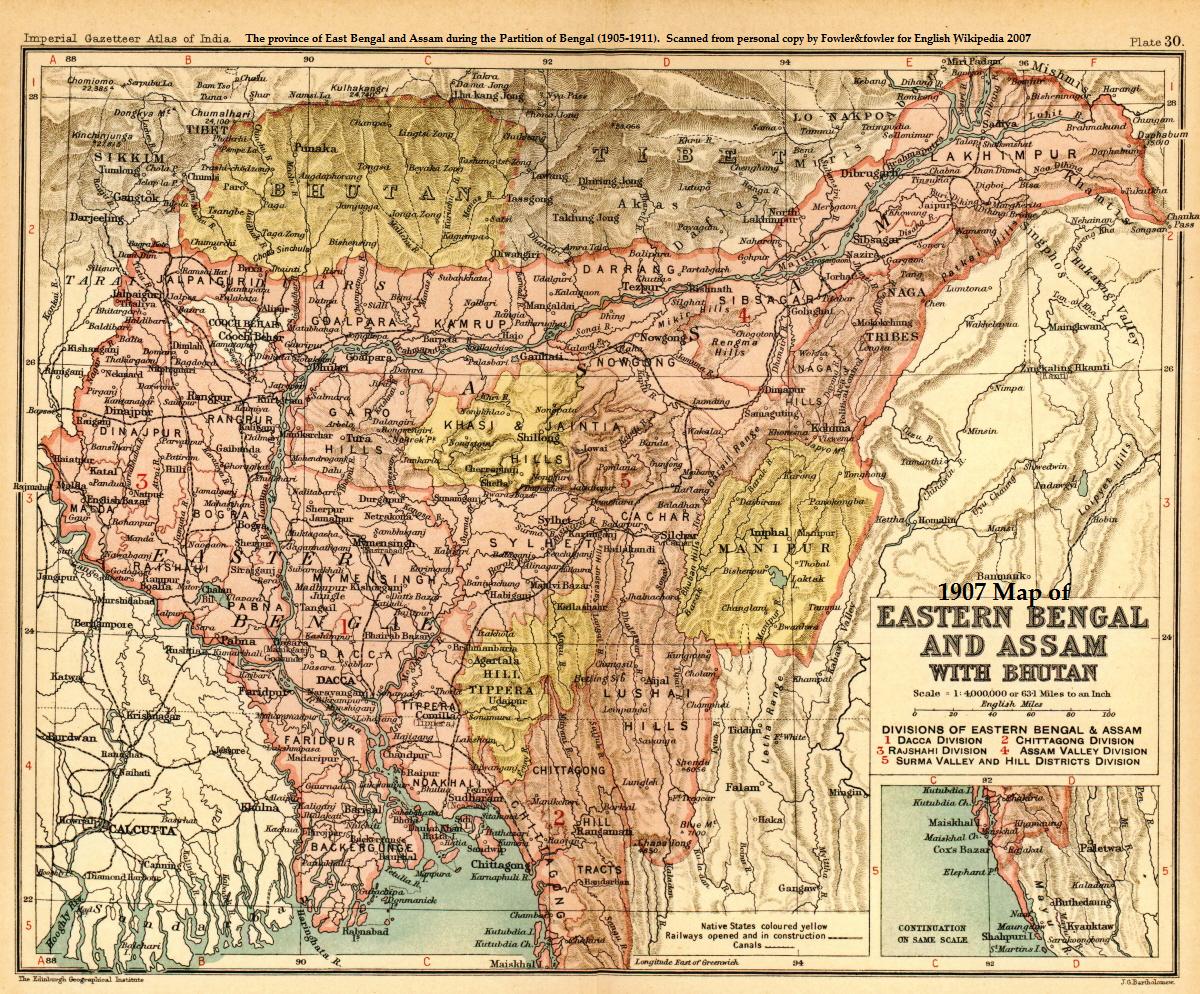|
Gaidinliu
Gaidinliu Pamei (26 January 1915 – 17 February 1993) popularly known as Rani Gaidinliu was a Naga spiritual and political leader who led a revolt against British rule in India. At the age of 13, she joined the Heraka religious movement of her cousin Haipou Jadonang. The movement later turned into a political movement seeking to drive out the British from Manipur and the surrounding Naga areas. Within the Heraka faith, she came to be considered an incarnation of the Goddess Cherachamdinliu. Gaidinliu was arrested in 1932 at the age of 16, and was sentenced to life imprisonment by the British rulers. Jawaharlal Nehru met her at Shillong Jail in 1937, and promised to pursue her release. Nehru gave her the title of "Rani" ("Queen"), and she gained local popularity as Rani Gaidinliu. She was released in 1947 after India's independence, and continued to work for the upliftment of her people. An advocate of the ancestral Naga religious practices, she staunchly resisted the conversi ... [...More Info...] [...Related Items...] OR: [Wikipedia] [Google] [Baidu] |
Heraka
Jadonang Malangmei (1905-1931) popularly known as Haipou Jadonang was a Naga spiritual leader and political activist from Manipur, British India. He established the ''Heraka'' religious movement, which was based on the ancestral Naga religion, and declared himself to be the "messiah king" of the Nagas. His movement was widespread in the Zeliangrong territory before the conversion to Christianity. He also espoused the cause of an independent Naga kingdom ("Makam Gwangdi" or "Naga Raj"), which brought him in conflict with the colonial British rulers of India. He was hanged by the British in 1931, and succeeded by his cousin Rani Gaidinliu. Early life Haipou Jadonang Malangmei was born on 30 July 1905 Sunday at Puiluan (also Puiron or Kambiron) village of the present-day Nungba Sub-Division in Tamenglong district. His family belonged to the Malangmei clan of the Rongmei Naga tribe. He was youngest of the three sons of Thiudai and Tabonliu. His father Thiudai died when he was aro ... [...More Info...] [...Related Items...] OR: [Wikipedia] [Google] [Baidu] |
Haipou Jadonang
Jadonang Malangmei (1905-1931) popularly known as Haipou Jadonang was a Naga people, Naga spiritual leader and political activist from Manipur, British India. He established the ''Heraka'' religious movement, which was based on the ancestral Naga religion, and declared himself to be the "messiah king" of the Nagas. His movement was widespread in the Zeliangrong territory before the conversion to Christianity. He also espoused the cause of an independent Naga kingdom ("Makam Gwangdi" or "Naga Raj"), which brought him in conflict with the colonial British rulers of India. He was hanged by the British in 1931, and succeeded by his cousin Rani Gaidinliu. Early life Haipou Jadonang Malangmei was born on 30 July 1905 Sunday at Puiluan (also Puiron or Kambiron) village of the present-day Nungba Sub-Division in Tamenglong district. His family belonged to the Malangmei clan of the Rongmei Naga people, Rongmei Naga tribe. He was youngest of the three sons of Thiudai and Tabonliu. His fat ... [...More Info...] [...Related Items...] OR: [Wikipedia] [Google] [Baidu] |
Rongmei Naga People
The Rongmei (also known as ''Kabui'') are one of the major indigenous communities a part of the Naga tribes of North-East India. The Rongmei Naga are a scheduled tribe under the Constitution of India. The Rongmei have a rich culture, customs and traditions. They share similarity with their kindred tribes of Zeme, Liangmai and Inpui which together are known as Zeliangrong. Rebellion Rongmei territory was conquered by the British in the nineteenth century. In 1891, they imposed a house tax on the people of Tamenglong. The Rongmei refused to pay any tax from 1891 to 1894. In response, C.L. Crawford, Assistant Political Agent of Manipur, used force to collect the tax from the Tamenglong hills in 1894. Four years of defiance by the Rongmei and its consequences aroused national consciousness among the Rongmei. Eventually, under the leadership of Haipou Jadonang and his successor Rani Gaidinliu, the Rongmei rebelled against British rule in the 1930s. This rebellion gave momentu ... [...More Info...] [...Related Items...] OR: [Wikipedia] [Google] [Baidu] |
Naga Hills District, British India
The Naga Hills District was a former district of the Assam province of British India. Located in the Naga Hills, it was mainly inhabited by the Naga ethnic groups. The area is now part of the state of Nagaland. History British colonial rule The Naga Hills district was created in 1866 by the Government of British India. Its headquarters were located at Samaguting (present day Chümoukedima). In 1875, the Lotha Naga region was conquered and annexed to the district. An administrative center was established at Wokha; this center was shifted to Kohima in 1879. In 1889, the Ao region was fully annexed to the Naga Hills District as a subdivision. The boundaries of the District were further extended to include most of the Sümi Naga (Sema Naga) territories (1904) and the Konyak Naga region (1910). In 1912, the Naga Hills District was made part of the Assam Province. The Government of India Act 1919 declared the Naga Hills District as a "Backward Tract". The area was to be treated as ... [...More Info...] [...Related Items...] OR: [Wikipedia] [Google] [Baidu] |
Kuki People
The Kuki people are an ethnic group native to the Mizo Hills (formerly Lushai), a mountainous region in the southeastern part of Mizoram and Manipur in India. The Kuki constitute one of several hill tribes within India, Bangladesh, and Myanmar. In Northeast India, they are present in all states except Arunachal Pradesh. Some fifty tribes of Kuki peoples in India are recognised as scheduled tribes, based on the dialect spoken by that particular Kuki community as well as their region of origin. The Chin people of Myanmar and the Mizo people of Mizoram are kindred tribes of the Kukis. Collectively, they are termed the Zo people. History Early history The early history of the Kukis is obscure. The origin of the word "Kuki" is uncertain; it is an exonym: it was not originally as a self-designation by the tribes that are now called Kukis. According to the colonial British writer Adam Scott Reid, the earliest reference to the word Kuki can be dated to 1777 CE, when it first appear ... [...More Info...] [...Related Items...] OR: [Wikipedia] [Google] [Baidu] |
Chowkidar
''Chowkidar'' is a 1974 Bollywood drama film directed by Shyam Ralham. The film stars Sanjeev Kumar, Yogeeta Bali, Vinod Khanna and Om Prakash in lead roles. Plot Shambhu (Om Prakash) is a village Chowkidar (night watchman), who is helpful to the poor that are oppressed by Lala Dinanath ( Jeevan). He has a sister who was missing for about a year. One night during the patrol, he finds his sister coming from the house of the village chief Thakur Ranvir Singh (D. K. Sapru). It turns out that his sister had a love affair with the Thakur and went into hiding once she got pregnant and now the Thakur is not accepting the girl child. Shambhu's sister hands him the baby and commits suicide by jumping into a nearby river. Shambhu first takes the baby girl to Thakur, who again rejects the baby and dies accidentally in an attempt to shoot at Shambhu. Shambhu raises the girl child on his own. Meanwhile, Lala Dinanath has a son, whom he sent to the city for higher education and to become a ... [...More Info...] [...Related Items...] OR: [Wikipedia] [Google] [Baidu] |
Imphal
Imphal ( Meitei pronunciation: /im.pʰal/; English pronunciation: ) is the capital city of the Indian state of Manipur. The metropolitan centre of the city contains the ruins of Kangla Palace (also known as Kangla Fort), the royal seat of the former Kingdom of Manipur, surrounded by a moat. Spread over parts of the districts of Imphal West and Imphal East, the former contains the majority of the city's area and population. Imphal is part of the Smart Cities Mission under the Ministry of Housing and Urban Affairs. History Initially ruled by King Khaba, Imphal was later ruled by the Pakhangba leaders. The clan of the Ningthouja tribe originated then. The Ningthouja tribe quickly expanded and dominated the region in politics and war. Kangla Palace was built by King Khagemba and his son Khunjaoba. The palace was later destroyed by the British during the Anglo-Manipur War. During the reign of Maharaja Bhagyachandra, there were a number of Burmese invasions. However, the kingdom su ... [...More Info...] [...Related Items...] OR: [Wikipedia] [Google] [Baidu] |
Life Imprisonment
Life imprisonment is any sentence of imprisonment for a crime under which convicted people are to remain in prison for the rest of their natural lives or indefinitely until pardoned, paroled, or otherwise commuted to a fixed term. Crimes for which, in some countries, a person could receive this sentence include murder, torture, terrorism, child abuse resulting in death, rape, espionage, treason, drug trafficking, drug possession, human trafficking, severe fraud and financial crimes, aggravated criminal damage, arson, kidnapping, burglary, and robbery, piracy, aircraft hijacking, and genocide, crimes against humanity, war crimes or any three felonies in case of three-strikes law. Life imprisonment (as a maximum term) can also be imposed, in certain countries, for traffic offences causing death. Life imprisonment is not used in all countries; Portugal was the first country to abolish life imprisonment, in 1884. Where life imprisonment is a possible sentence, there may als ... [...More Info...] [...Related Items...] OR: [Wikipedia] [Google] [Baidu] |
Manipur (princely State)
The Manipur Kingdom was an ancient independent kingdom at the India–Burma frontier that was in subsidiary alliance with British India from 1824, and became a princely state in 1891. It bordered Assam Province in the west and British Burma in the east, and in the 20th century covered an area of 22,327 square kilometres (8,621 sq mi) and contained 467 villages. The capital of the state was Imphal. The early history of Manipur is composed of mythical narratives. The Kangla Fort, located on the banks of the Imphal River, is where the palace of King Pakhangba was located. It was built in 1632 by king Khagemba, who had defeated Chinese invaders. In the fort, a number of temples that had traditional religious significance are located. Kangla means "dry land" in the old Meitei language. Kangleipak State The Kingdom of Kangleipak was established by King Loiyumba in 1110 who ruled between 1074 and 1121. He consolidated the kingdom by incorporating most of the principalities ... [...More Info...] [...Related Items...] OR: [Wikipedia] [Google] [Baidu] |
Colonial Assam
Colonial Assam (1826–1947) refers to the period of History of Assam between the signing of the Treaty of Yandabo and Independence of India when Assam was under the British colonial rule. The political institutions and social relations that were established or severed during this period continue to have a direct effect on contemporary events. The legislature and political alignments that evolved by the end of the British rule continued in the post Independence period. The immigration of farmers from East Bengal and tea plantation workers from Central India continue to affect contemporary politics, most notably that which led to the Assam Movement and its aftermath. British annexation of Assam The region that came to be known as undivided Goalpara district came under British rule after the transfer of the Deewani from the Mughal Emperor on August 12, 1765. Due to indigenous ethnic influences on the region the police ''thanas'' of Dhubri, Nageswari, Goalpara and Karaibari were pl ... [...More Info...] [...Related Items...] OR: [Wikipedia] [Google] [Baidu] |
Robert Niel Reid
Sir Robert Niel Reid (15 July 1883 – 24 October 1964) was a British colonial administrator in India. He was Governor of Assam from 1937 to 1942. His son, Sir Robert Basil Reid, was chairman of the British Railways Board British may refer to: Peoples, culture, and language * British people, nationals or natives of the United Kingdom, British Overseas Territories, and Crown Dependencies. ** Britishness, the British identity and common culture * British English, ... from 1983 until 1990. References {{DEFAULTSORT:Reid, Robert 1883 births 1964 deaths Governors of Assam Indian Civil Service (British India) officers Knights Commander of the Order of the Star of India Knights Commander of the Order of the Indian Empire People educated at Malvern College Alumni of Brasenose College, Oxford Recipients of the Kaisar-i-Hind Medal ... [...More Info...] [...Related Items...] OR: [Wikipedia] [Google] [Baidu] |





